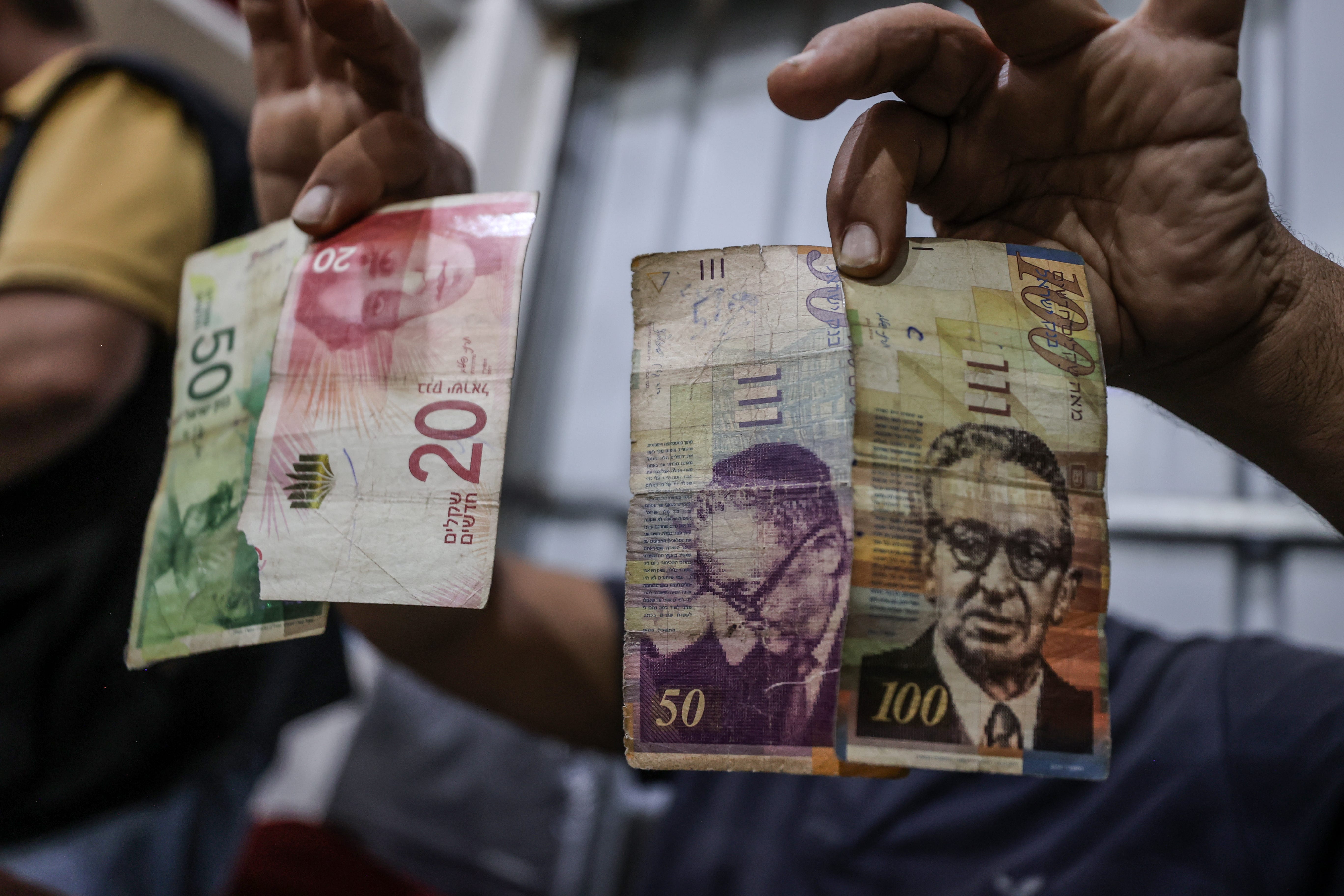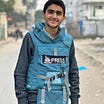Cash Crisis in Gaza: “I barter my belongings to eat”
Palestinians in Gaza barter staple goods to fight starvation

DEIR AL-BALAH — Every morning, 14-year-old Abdullah al-Basoos leaves his dilapidated tent in Deir al-Balah and heads to the open market to try to find food for his mother and five siblings. As the eldest child, al-Basoos is responsible for making sure everyone gets something to eat. His father, who stayed behind after the rest of the family fled their home in the al-Shujaiya neighborhood in Gaza City at the outset of Israel’s genocidal assault, was killed in an Israeli airstrike. Al-Basoos now spends much of the day manning a makeshift stall selling staple items like sugar, salt, and rice to try and earn some money to buy food for his family. But with skyrocketing prices and a severe cash shortage across Gaza, like many Palestinians he now finds himself having to barter.
Last week, he couldn’t afford to purchase a small amount of white cheese, which at 12 shekels (approximately $4) was too overpriced. He ended up trading some halva for the cheese at a nearby stall. He had done these types of exchanges many times before, like bartering sugar for cooking oil—trading one staple item for another in a desperate bid to survive.
“I have to barter my belongings to eat. I sometimes have to give up some basic necessities to get food. It’s a matter of prioritizing things when all things are desperately needed,” al-Basoos told Drop Site News. “I work all day and only make about 20-40 shekels a day”—about $5 to $11. “But what does that actually get for me or my family? It is not at all sufficient as that would only buy me two cucumbers and two tomatoes. It takes two days of work to buy one kilo of rice.”
In a landmark report published this week, Amnesty International concluded Israel is committing genocide against Palestinians in Gaza and listed Israel’s “extreme and deliberate restrictions” on aid leading to widespread malnutrition, hunger and starvation among the causes. Last month, the International Criminal Court issued arrest warrants for Israeli Prime Minister Benjamin Netanyahu and Defense Minister Yoav Gallant for war crimes including the starvation of civilians. A UN-backed panel recently issued an alert warning of “an imminent and substantial likelihood of famine occurring, due to the rapidly deteriorating situation in the Gaza Strip.” Bakeries in central Gaza have been forced to shut down due to flour and fuel shortages, looting and extortion are rampant and commercial supplies have come to a near halt. This week, UNRWA announced it was pausing aid deliveries through Karam Abu Salem, the main border crossing for goods in the south, due to a lack of safety.
“I haven’t had any flour or bread for nearly a week. I lack many basic necessities, including food, water, protection, and many things. I lack everything. I live in a shabby tent where rain comes in on us. I shiver with fear and cold every day. The same for all my siblings. I never worked in my life. I was a happy school student, but I am now forced to work. We only have one meal per day from the nearby free food distribution centers. But this option is not always guaranteed,” al-Basoos said. “We barely eat and have to save our earnings to buy most of the most basic things.”
Food prices have soared. A kilo of sugar costs currently around $13 while a liter of cooking oil goes for $30. For a family to share a meal of rice and meat, the cost is over $200, an unattainable sum.
Compounding the crisis is the shortage of banknotes in Gaza or any access to hard currency, primarily Israeli shekels. Israel has bombed and destroyed nearly all the banks and ATMs in Gaza and has blocked imports of cash despite dwindling supplies. Banks have also been attacked and looted and inflation is skyrocketing.
"You're starting to have these midway economies because merchants are willing to accept whatever, just because they want to sell, and vice versa, people want to buy goods and they don't have money," says Zayne Abudaqqa, a senior fellow at The Institute for Social and Economic Progress based in Ramallah. "So bartering has become a very big thing."
Bartering groups are even being created on Facebook and other social media platforms, where participants agree to meet and exchange goods.
As the fiscal situation worsens, currency dealers and exchanges are now charging high commission rates for providing cash. Tareq Sabbah, a currency broker in Deir al-Balah, says commissions have risen to as much as 30% recently, up from 15% just a couple of months ago. Some sellers accept credit cards, or bank or smartphone wallet transfers, but those digital transactions also come with high commission rates that aggravate the already inflated prices.
Additionally, the physical quality of banknotes also affects their value. With no fresh notes being circulated in Gaza’s economy, shekels are ripping apart from wear and tear. “The Israeli army doesn’t permit cash into Gaza. Therefore, it’s the same banknotes and coins that move among people’s hands,” a senior official at the Consumer Protection Department at the Palestinian Ministry of National Economy told Drop Site on condition of anonymity for fear of reprisal.
Torn banknotes are valued less than new ones, meaning a torn 20 shekel note might only be worth 15 shekels on the market. Even metal coins are becoming worn and rusty and losing value.
“The targeting of banks has exacerbated the situation in Gaza. Banks are closed due to the fear of being looted by criminal gangs, being targeted by Israeli forces, or going bankrupt,” Sabbah said. “The three functioning banks in Deir al-Balah can’t meet the needs of around one million people. A number of merchants also control much of the cash in Gaza, exploiting the situation and people’s needs. Consequently, we, as exchange offices, are forced to buy cash at inflated prices and sell it to people at the same rates. We really don’t profit at all.” Though he admitted that some brokers do take advantage of the situation and double their commission rates in order to profiteer as much as possible.
The fees or commission rates are based on the supply and demand of money, Abudaqqa said. “The exchanges don’t print money, they have a finite sum of cash. So it depends on how much cash is being asked from them versus how much new cash they are able to get a hold of,” Abudaqqa said. “But the rates are also varying all the time, which means people can be scammed.”
The economic crisis is made worse by merchants who hoard cash when they can, according to Sabbah, in addition to their having to pay high extortion or fees to companies that coordinate with the Israeli military to be able to get goods into Gaza. “It feels like it is a campaign spearheaded by the Israeli army and implemented by looters and deceitful merchants,” Sabbah told Drop Site News.
“It all hampers access to basic necessities for thousands of people who can’t afford to pay such excessive commission rates,” he said. “So today you can see that people tend to barter because there appears to be no solution to this problem. The only solution is to reopen the crossings, get products in, and resume bank operations. Cash will flow in as a result. But I don’t see this being feasible without an immediate end to the war.”
The barter economy has increasingly taken hold in Gaza over the past few months as humanitarian aid and commercial goods deliveries have been strangled and banknotes made scarce. Food items are what are most commonly exchanged as their prices fluctuate wildly with the restricted food supply. But people also barter clothes, household goods, phones and other electronic devices – sometimes combined with cash – in order to obtain basic supplies.
Alaa Al-Motawaq, a 32-year-old father of three who was displaced from his home in Jabaliya at the beginning of the war last year, runs a makeshift stall selling hygiene products outside the Al-Aqsa Martyrs hospital in Deir al Balah.
“People don’t have cash because the commission rates are mad – no one is ready to pay nearly half of what they earn to get their cash. That’s why people opt to barter nowadays. ” Motawaq said. “Here in my makeshift stall, some people barter a pack of tissues for a bar of soap, others sell the hygiene materials they receive in aid boxes, or sell their own belongings, to get cash and buy food for their families, while others offer a low-quality product to barter and pay the remainder with cash.”
Motawaq says he doesn’t refuse anyone who comes to barter. “I understand what they're going through as I am one of them,” he said. “I make around $7 to $15 a day, but this is not enough to buy one kilo of tomatoes, which costs over $15. As a result, I constantly feed my children macaroni because it is relatively inexpensive. There are no other options. They frequently ask me for other things, particularly bread, but I feel pained to tell them I cannot afford any of these items and must ration bread out to one loaf a day, if not less.”
The consumer protection department at the National Economy Ministry is tasked with protecting against price gouging and monitoring the quality of food and goods. “The economic situation is utterly catastrophic because Israel doesn’t allow the entry of goods, destroyed the economic infrastructure, and bulldozed and decimated the agricultural sector all across Gaza,” the ministry official said. “The aid is regularly looted and then sold in markets. Meanwhile, some humanitarian organizations work closely with the Israeli military to get goods in for insane fees to merchants, ranging from $20,000 to $100,000 for each shipment. These organizations take high commissions from the merchants, making for the overpricing of basic life necessities.”
He added, “We have been threatened and attacked by criminal gangs here in Deir al-Balah as they had ordered us to stop working…We would normally do our work with the protection of local security forces, but Israel has targeted us multiple times in the past. So there is no way to provide protection or organization against the backdrop of the presence of criminal gangs and Israeli occupation forces even though the Palestinian Monetary Authority has been pressing hard to reopen bank branches and enhance the situation. Israel has denied that and continues blocking aid and closing the crossings.”
Sharif Abdel Kouddous contributed reporting.






This is beyond heartbreaking. There is a Facebook page called “native Palestinians”. The postings are genuine and sadly profound. Some of us Americans have connected with Palestinian individuals who post there, create personal connections with them through WhatsApp for personal support and love, and/or to send them funds directly. (You need to vet of course since some folx dishonesty try to raise $ this way.) I’ve been in touch personally with a woman there for a long time and it means a lot to her. Her husband was taken away a year ago and she’s left with three young children 3,5 and 7, to care for. They are cold and wet and starving. She asks for prayers. I raise money for this family and actually 12 other families, through donations from my circles. You might want to check out this opportunity. ❤️🩹
Time to make the Holy Land holy again. The best thing Pope Francis could ever do is to make his stand in Gaza, or Bethlehem. He has an opportunity that is unequalled, to say "no" to genocide. If Gaza is no longer an option, thanks to the total blockade by Israel. He could even go to the West Bank, Beirut, or even Teheran.
May it be his road to Damascus moment, and say, “Not in our name, not on our watch.”
Please sign the petition and share widely.
https://chng.it/gkvBfY44rq